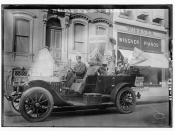The Victorian Age in England was a complex time, a time of great national pride as a major empire and military power well as a time of stern domestic examination as class distinctions among the rich, the poor, the landed, the titled, and the unemployed continued to develop. Elizabeth Barret Browning, Robert Browning, and Alfred Lord Tennyson were three leading poets of the era who explored themes of social conscience and class distinction as well as searching for a way to actually represent the times in which they lived accurately and artistically.
Barret Browning was quoted as saying poets should represent "their age, not Charlemagne's". By this, Barret Browning was taking the license to write about current issues and concerns that moved her and her generation instead of being limited to the traditional themes of poetry. Her poem "The Cry of the Children" is a particularly poignant accusation of the richer upper class Londoners who would go about their business while children under the age of ten were slaving away in mines and factories.
Barret Browning wrote the poem after reading the "Report on Child Labor, 1843" which was commissioned by Parliament and contained many startling facts, including that some children in the poorest classes began work as early as five years old, that time of work often exceeded twelve hours a day and sometimes ran to eighteen, and that many times after the age of seven or eight, the child became a type of indentured servant and could and would be thrown in jail, regardless of age, if the indenture was broken. In Browning's poem, the children cry out for rest from these oppressive working conditions and find that the only real rest is in death, like their friend little Alice, who "from the sleep wherein she...


